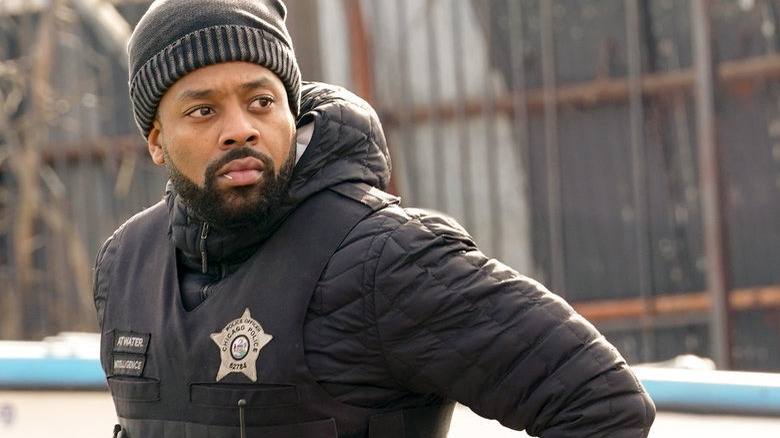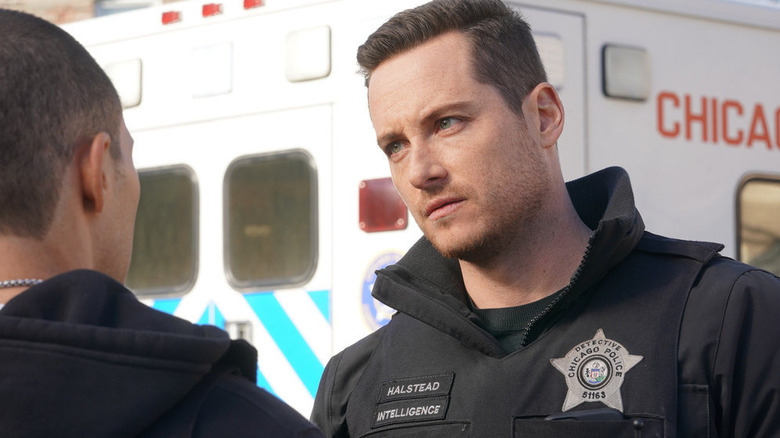Why The Intelligence Unit Has Some Chicago PD Fans Scratching Their Heads
While NBC's cop drama "Chicago P.D." draws a large enough audience to sustain a run that currently totals nine seasons and counting, members of its viewerbase base are not shy about expressing confusion at or outright criticism of the series.
For instance, a number of viewers have shared some brutal thoughts about Detective Jay Halstead (Jesse Lee Soffer), who is one of the show's principal characters. In short, detractors have described him as becoming increasingly arrogant. Whereas in their estimation, Halstead may have overstayed his welcome, "Chicago P.D." has angered fans in equal measure over its handling of the departures of certain cast members like Lisseth Chavez and Melissa Sagemiller.
In some other cases, fans have not quite criticized but merely questioned the show's contents, like a John Travolta sticker in the evidence room that hints at a link between "Chicago P.D." and Scientology. In fact, even after nine seasons, some viewers are confused about the very nature of the team at the series' core.
Fans want to know what distinguishes the Intelligence Unit from other teams
In June of 2022, one user started a thread on the "Chicago P.D." subreddit titled "What is the 'Intelligence Unit' exactly?" In it, they question what makes the show's core Intelligence Unit distinct from a normal cop team, citing "Law & Order: SVU" as an example of a show in which the nature of the central team mentioned in its title is clear. "Chicago P.D.," by contrast, revolves around a group of cops seemingly responsible for standard cop work, in spite of the fact they seem to be designated specialists. "To me intelligence is compiling information and should involve single cases investigated over a long period of time but they have a new case each week," they wrote.
Commenters then chimed in with a number of answers to this inquiry. User GentonWheels, for example, pointed out that the Intelligence Unit seems to work undercover or employ undercover agents more frequently than might be typical. User170863, meanwhile, cited a fan page that lists organized crime, drug trafficking, and murder as the three departments for which the Intelligence Unit is responsible. User notGeneralReposti contradicted this claim somewhat, arguing that the Intelligence Unit is effectively a distinction invented by the series' producers in order to give its characters free reign to work on cases unrestricted by areas of specialization.
In short, then, no single viewer is entirely sure as to why, exactly, the Intelligence Unit exists in the series' fiction.
The Intelligence Unit is inspired by, but largely differs from a real-life CPD unit
While a single, authoritative rundown of the Intelligence Unit's responsibilities doesn't seem to exist anywhere online, a couple of experts on the subject have provided some first-hand insight into just what the core group on "Chicago P.D." is and isn't.
Perhaps most notably, an article promoting a visit by "Chicago P.D." executive producer Derek Haas to his alma mater Baylor University quotes a now-deleted NBC video in which Haas himself describes the members of the Intelligence Unit as specially-privileged in broad terms. "It's not your typical bullpen where there's just people walking in and out. This is their unit," he said.
Meanwhile, in a Quora thread discussing the Intelligence Unit on "Chicago P.D.," a user named Les Smulevitz — who lists a MA in Police and Law Enforcement as one of their qualifications — claimed that the Intelligence Unit exists in the real-life Chicago Police Department. However, unlike on TV, the real Intelligence Unit is limited to collecting intelligence on criminal operations and aiding in criminal prosecution. "The Wolfe productions TV intel unit is more like, but not much like for entertainment purposes, a district tactical/plainclothes team," they wrote.
So, while the Intelligence Unit does, in fact, seem to exist, its TV counterpart appears to be largely an invention of the series' producers, intended to indicate that its members are simply higher in station than everyday cops.


